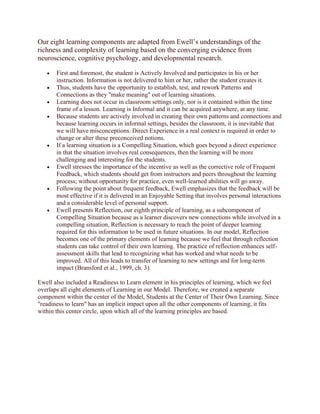Ewell priciples of learning
•Télécharger en tant que DOCX, PDF•
0 j'aime•2,175 vues
Signaler
Partager
Signaler
Partager

Recommandé
Recommandé
Contenu connexe
Tendances
Tendances (20)
Tajuk 2 penubuhan unit unit kokurikulum di sekolah

Tajuk 2 penubuhan unit unit kokurikulum di sekolah
Peranan guru memupuk Integrasi Nasional Kearah Perpaduan sekolah.docx

Peranan guru memupuk Integrasi Nasional Kearah Perpaduan sekolah.docx
Topik 3 implikasi kepelbagaian sosio budaya terhadap 3

Topik 3 implikasi kepelbagaian sosio budaya terhadap 3
Komuniti Pembelajaran Profesional : Teacher Sharing Session

Komuniti Pembelajaran Profesional : Teacher Sharing Session
Similaire à Ewell priciples of learning
Similaire à Ewell priciples of learning (20)
Teaching and Learning Principles with Instructional Planning

Teaching and Learning Principles with Instructional Planning
EDUCATIONAL TECHNOLGY - EDUCATIONAL TECHNOLOGY IN LEARNING AND DEVELOPING EDU...

EDUCATIONAL TECHNOLGY - EDUCATIONAL TECHNOLOGY IN LEARNING AND DEVELOPING EDU...
Lesson 6 ppt- Relabeth David-Rovelyn Flores- Yvonne Rebecca Pastorfide

Lesson 6 ppt- Relabeth David-Rovelyn Flores- Yvonne Rebecca Pastorfide
FLCT - Chapter 1 - Learner-Centered Theories of Learning

FLCT - Chapter 1 - Learner-Centered Theories of Learning
EDUCATIONAL TECHNOLOGY IN LEARNING & DEVELOPING EDUCATIONAL OBJECTIVES

EDUCATIONAL TECHNOLOGY IN LEARNING & DEVELOPING EDUCATIONAL OBJECTIVES
Theory of Teacher Education Behavioral Perspective

Theory of Teacher Education Behavioral Perspective
Implementing social and emotional learning--Where, when and how often?

Implementing social and emotional learning--Where, when and how often?
Dernier
APM Welcome
Tuesday 30 April 2024
APM North West Network Conference, Synergies Across Sectors
Presented by:
Professor Adam Boddison OBE, Chief Executive Officer, APM
Conference overview:
https://www.apm.org.uk/community/apm-north-west-branch-conference/
Content description:
APM welcome from CEO
The main conference objective was to promote the Project Management profession with interaction between project practitioners, APM Corporate members, current project management students, academia and all who have an interest in projects.APM Welcome, APM North West Network Conference, Synergies Across Sectors

APM Welcome, APM North West Network Conference, Synergies Across SectorsAssociation for Project Management
Dernier (20)
Kisan Call Centre - To harness potential of ICT in Agriculture by answer farm...

Kisan Call Centre - To harness potential of ICT in Agriculture by answer farm...
BAG TECHNIQUE Bag technique-a tool making use of public health bag through wh...

BAG TECHNIQUE Bag technique-a tool making use of public health bag through wh...
Z Score,T Score, Percential Rank and Box Plot Graph

Z Score,T Score, Percential Rank and Box Plot Graph
Web & Social Media Analytics Previous Year Question Paper.pdf

Web & Social Media Analytics Previous Year Question Paper.pdf
Disha NEET Physics Guide for classes 11 and 12.pdf

Disha NEET Physics Guide for classes 11 and 12.pdf
Measures of Dispersion and Variability: Range, QD, AD and SD

Measures of Dispersion and Variability: Range, QD, AD and SD
APM Welcome, APM North West Network Conference, Synergies Across Sectors

APM Welcome, APM North West Network Conference, Synergies Across Sectors
Presentation by Andreas Schleicher Tackling the School Absenteeism Crisis 30 ...

Presentation by Andreas Schleicher Tackling the School Absenteeism Crisis 30 ...
Ewell priciples of learning
- 1. Our eight learning components are adapted from Ewell’s understandings of the richness and complexity of learning based on the converging evidence from neuroscience, cognitive psychology, and developmental research. First and foremost, the student is Actively Involved and participates in his or her instruction. Information is not delivered to him or her, rather the student creates it. Thus, students have the opportunity to establish, test, and rework Patterns and Connections as they "make meaning" out of learning situations. Learning does not occur in classroom settings only, nor is it contained within the time frame of a lesson. Learning is Informal and it can be acquired anywhere, at any time. Because students are actively involved in creating their own patterns and connections and because learning occurs in informal settings, besides the classroom, it is inevitable that we will have misconceptions. Direct Experience in a real context is required in order to change or alter these preconceived notions. If a learning situation is a Compelling Situation, which goes beyond a direct experience in that the situation involves real consequences, then the learning will be more challenging and interesting for the students. Ewell stresses the importance of the incentive as well as the corrective role of Frequent Feedback, which students should get from instructors and peers throughout the learning process; without opportunity for practice, even well-learned abilities will go away. Following the point about frequent feedback, Ewell emphasizes that the feedback will be most effective if it is delivered in an Enjoyable Setting that involves personal interactions and a considerable level of personal support. Ewell presents Reflection, our eighth principle of learning, as a subcomponent of Compelling Situation because as a learner discovers new connections while involved in a compelling situation, Reflection is necessary to reach the point of deeper learning required for this information to be used in future situations. In our model, Reflection becomes one of the primary elements of learning because we feel that through reflection students can take control of their own learning. The practice of reflection enhances self- assessment skills that lead to recognizing what has worked and what needs to be improved. All of this leads to transfer of learning to new settings and for long-term impact (Bransford et al., 1999, ch. 3). Ewell also included a Readiness to Learn element in his principles of learning, which we feel overlaps all eight elements of Learning in our Model. Therefore, we created a separate component within the center of the Model, Students at the Center of Their Own Learning. Since "readiness to learn" has an implicit impact upon all the other components of learning, it fits within this center circle, upon which all of the learning principles are based.
